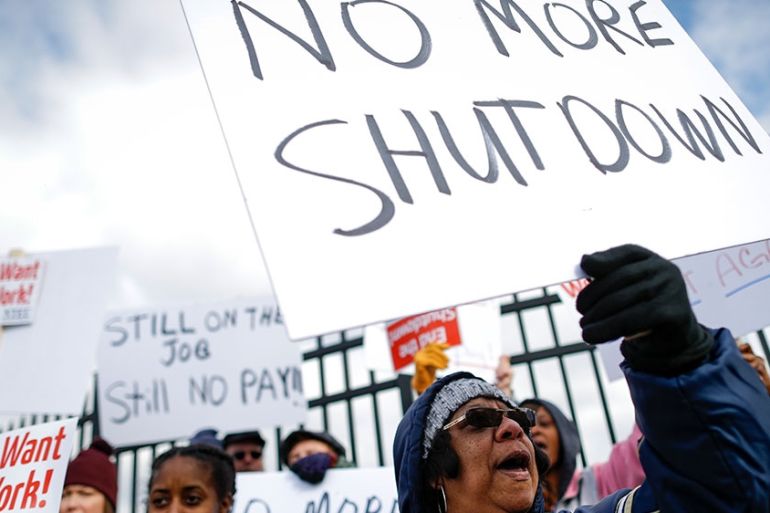US shutdown: Thousands of federal workers miss paycheques
Trump edges closer to declaring national emergency as shutdown, now rivalling longest on record, hits 21st day.

Thousands of federal workers won’t receive a paycheque on Friday as the partial US government shutdown stretches into its 21st day, rivalling the longest on record.
More than half of the 800,000 federal employees affected are still on the job, while the others were furloughed when key federal departments and agencies shut down on December 22 after Donald Trump, his fellow Republicans and Democrats failed to come to an agreement on whether to allocate more than $5bn in funding to the president’s border wall project.
Keep reading
list of 4 itemsCohen faces more cross-examination as Trump’s trial enters final stretch
Key takeaways from day 18 of Donald Trump’s New York hush money trial
Who benefits from US tariffs on Chinese imports? Experts weigh in
On Thursday, during a visit to the US-Mexico border, Trump renewed his threat to declare a national emergency to circumvent Congress and find funds for the border wall, a move that, if he were to take it, would likely be challenged in the courts.
Democrats, who oppose the wall, blame Trump, who has so far refused to back down on his demand for $5.7bn in funding, for the shutdown. They have instead said they will provide more than $1.3bn for border security measures, which do not include a wall.
“I don’t even know if Trump wants the wall, I think he just wants to debate on the wall,” House Speaker Nancy Pelosi, a Democrat, told reporters on Thursday, suggesting that a meeting between her party and the president a day prior was a “setup” so Trump “could walk out”.
At that meeting, Trump abruptly left after Pelosi told him Democrats would not fund the wall in exchange for his ending the shutdown.
National emergency
Trump, who initially said he would be “proud” to shut down the government for border security, blames the Democrats, saying the wall is necessary to stem irregular immigration and stop the flow of illegal drugs into the US. Critics have pointed out that most drugs cross between official ports of entry.
With workers missing their first paycheque and increased impacts on national parks, the economy and federal programmes, Republicans are feeling the pressure to find a way to end the shutdown. But Mitch McConnell, the top Republican in the Senate, has so far refused this year to bring any legislation that Trump won’t sign to a vote.
![Trump speaks to reporters as he visits the banks of the Rio Grande River with Senators John Cornyn and Ted Cruz and US Customs and Border Patrol agents during his visit to the US-Mexico border [Leah Millis/Reuters]](/wp-content/uploads/2019/01/74806c8929614aed9a6cc50569bcd195_18.jpeg)
Meanwhile, Trump appeared to be inching closer to declaring a national emergency. US media, citing unnamed sources, reported that the White House had asked the US Army Corps of Engineers to look to divert money from its budget towards the wall and explore how fast construction could begin under an emergency declaration.
Republican Senator Lindsey Graham said in a statement that it was “time for President Trump to use emergency powers to fund the construction of a border wall/barrier”. But other Republicans have expressed doubts, given the potential legal hurdles such a move may face.
‘How in the hell are we going to eat?’
On Thursday, federal workers across the country rallied against the shutdown.
At the Washington, DC rally, Richard Trumka, the president of the AFL-CIO, a federation of unions, called the shutdown a “lockout”.
“Shame on the Senate. Shame on the White House,” he told the crowd. “This lockout has to end, and it has to end now.”
In Detroit, federal worker Gregory Simpkins told the Associated Press, “Next week, it’s going to be a panic mode. How are we going to pay rent? How are we going to pay out bills? How in the hell are we going to eat?”
In New York, furloughed Park Ranger Kathryn Gilson said if the shutdown goes much longer it will probably cause her to go into a depression. “I’m kind of just sitting and staring at the wall and trying not to lose my mind,” she said.
![Union members and Internal Revenue Service workers rally against the partial government shutdown in Covington, Kentucky [John Minchillo/AP Photo]](/wp-content/uploads/2019/01/2465cc8be24a40028db22cbd5e9c5944_18.jpeg)
Another furloughed park ranger, Sean Ghacala, said he hopes “this can get resolved and we can get past all of this … putting precious federal funding towards things that will only make … division worse … What we need is to reopen the government and get past this racism and xenophobia.”
Also on Thursday, the Senate approved a bill to ensure that all federal employees will be paid retroactively after the shutdown ends.
The bill requires that all employees – including those who have been furloughed – be paid as soon as possible once the government reopens. The bill now goes to the House of Representatives.
The Democrat-controlled House has also passed several bills that would fund specific government departments. The bills would still need to be passed by the Senate, where Republican leaders have vowed not to bring them to a vote.
![Federal air traffic controller union members rally against the partial US federal government in Washington, DC [Jonathan Ernst/Reuters]](/wp-content/uploads/2019/01/ea9ec0fcc41944c2a2255b2cd07a9e4c_18.jpeg)